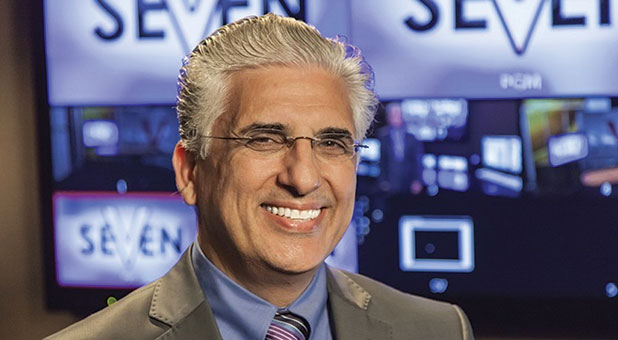Meet the Billy Graham of Iran
Simplicity of Faith
Shariat was born Sept. 9, 1955, into a Muslim family in Tehran, Iran. He grew up as a fairly devout Muslim but began to question his Islamic faith as a teen.
“I started thinking, ‘What is this religion I’m following? I’m repeating these prayers, but it’s not adding anything to my life. I’m not changed. I don’t have peace. I don’t have joy. I don’t even experience the presence of God,'” he recalls. “So I stopped doing it, and I focused on my studies and being a good person.”
Shariat, along with his wife, Donnell, came to the U.S. following the Islamic Revolution in 1979 to earn his Ph.D. in computer engineering at the University of Southern California. The revolution reawakened his spiritual yearnings, and he began to read the Bible.
“I was struggling with every verse,” Shariat says. “Who is this Jesus? At the time, my theory was that all religions were the same. But the more I studied the Quran and the Bible, the more I realized that both could not be true. They are so contradictory.”
After struggling for a while with this dilemma, Shariat began attending the Church of the Open Door in downtown Los Angeles in 1980, famous for its huge “Jesus Saves” sign on the building.
“I went there to get my answers,” Shariat says. “After a few weeks, I realized the message was simple: You believe the simple truth that you’re a sinner and that God loves you. I read the Sermon on the Mount and learned that we’re all sinners. The basic message of the gospel was very logical to me. I came to the point where I said I was going to try it. I said, ‘Jesus, come into my heart and my life.'”
Satellite of Hope
After obtaining his Ph.D. in 1987, Shariat obtained employment in San Jose doing artificial intelligence research. He and his wife also felt led to start a house church, which began with just a few people but quickly grew to include hundreds of Muslim converts and now remains one of the largest churches of its kind in the U.S.
After planting more churches among Iranian Muslims in Northern California, Shariat founded Iran Alive Ministries in 2001. Shortly after the Sept. 11, 2001, terrorist attacks, Shariat’s first satellite broadcast program aired in Iran.
“From day one, the response was amazing,” he says. “We were getting hundreds of phone calls. TV is a lifeline for Iranians. Christian television is not entertainment. This is their only source of hope.”
Although satellite dishes are illegal in Iran, Shariat reports that more than 80 percent of Iranians have access to satellite television broadcasts.
“A friend of mine came back from Iran recently and showed me pictures of Bedouin tents with satellite dishes,” he says. “They don’t have running water, but they have a satellite dish with a generator. [It’s] their only connection to the outside world.”
In 2003, Shariat’s ministry became involved in planting underground churches in Iran. In recent years, hundreds of house church leaders have been arrested, including American pastor Saeed Abedini, who’s married to Shariat’s niece, Naghmeh. Abedini, whose plight has gained international media attention, remains imprisoned in Iran’s deadliest prison.
Shariat says that after several decades under the current regime, many Iranians are concluding Islam is not the answer. They see the regime as a problem and the reason for their miserable lives, and they’re turning to Christianity despite severe government persecution.
“I’ve seen a new movement and a new mindset developing among Iranians, especially young people,” he says. “I read more and more young people’s blogs that are saying, ‘If we want to have a future, we need to get rid of Islam.’ I believe Islam is experiencing its greatest defeat in history. It’s so wide and deep that it’s irreversible.”















































